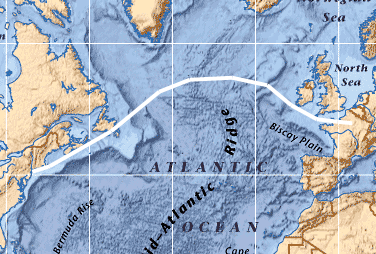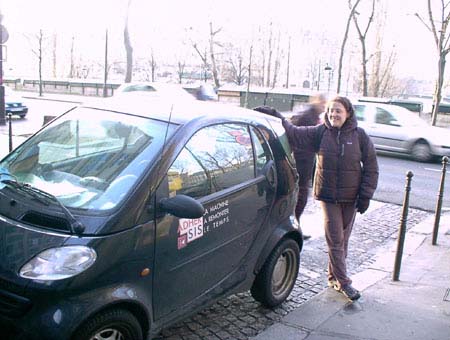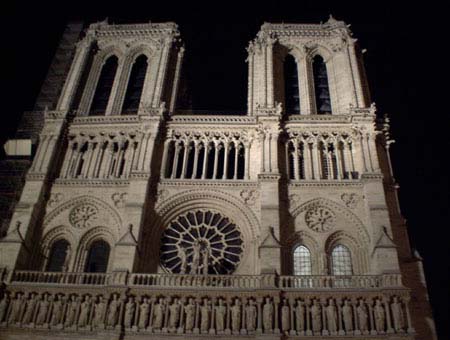|
|
|
a place just to sleep in Paris
Tuesday, January 22 2002
setting: North Atlantic
Heading eastward six time zones by jet plane at 600 miles per hour takes about seven hours and eats up 13 hours of the day. Thus, "January 21st" was truncated early in my life and I was whisked directly into the morning of January 22nd in Paris.
After hours of seeing nothing but the black Atlantic beneath us, the vision of populated coastlines, speckled with electric lights, was unexpectedly welcoming, reassuring, and even a little surprising. I was amazed by how denseness of lights along the coastline of Land's End, England. This was my first vision of Europe, a land which has been grossly overpopulated for many hundreds of years. Living in the ruins of the ruins of the ruins, they go on about their lives, with all the benefits of the modern world.
As we crossed over the Cotentin Peninsula in France, there was a period during which I could see the lights of civilization on both sides of the English Channel. I could see England and I could see France. As for Gretchen's underpants, well, they were already in a little plastic bag; she'd spilled wine in her lap somewhere over the Atlantic.

The way we flew eastward.
French customs were perfunctory at best. A glance at our passports, and we were loosed upon the land. After a visit to a cash machine, our wallets were filled with crisp colorful new euros, each denomination a slightly different size, the 50s a little too large for my sensible Fossil® wallet. Euros are so new in France that there are posters everywhere to help people understand how the money should look.
Since we'd landed at the Charles de Gaulle Airport northeast of Paris, the first order of business was getting into the heart of the city. We tried getting tickets for the RER using the automatic machines, but they weren't working, so we simply jumped the turnstile and rode into Paris for free.
It was early morning pre-rush hour, and the train rapidly filled with working people. Along our train's route, most of these workers appeared to be African immigrants.
When we got out at the St. Michel RER station, a machine wanted to look at our tickets before releasing us into the free world, but since we'd never bought a ticket to begin with, we had to jump the turnstile again. It was reassuring that a young man coming into the station was jumping the turnstile in the opposite direction.
After getting oriented with respect to the Seine and determining that we were actually on the Left Bank and not the Right, we crossed over to the Right and went in search of a Hotel in the 4th Arrondissement. At two different places, Gretchen made inquiries and learned that no rooms would be available until 11:00am. Since it was only about 8:30am, this meant we'd have to find a place to exist for two and a half hours, despite the fact that all we really wanted to do was crawl into bed and sleep.
So we found our way to a brasserie, sat down at a table, and ordered tomato drinks. I thought I should avoid caffeine, since it seemed we'd be sleeping soon, so I had a Bloody Mary, which in French is pronounced "Bloody Mary." Gretchen handled all the talking, since she had more than a passing familiarity with French. Her French was actually much better than she'd led me to expect, although every now and then she'd get a little confused and use a Hebrew word (she also knows Hebrew and some Italian).
French brasseries are pretty much all the same. The guys working the bar and serving as waiters all wear spotless white shirts and black vests. All throughout the day, people come in, stand for a short time at the bar (there are no bar stools), and drink tiny cups of espresso, called "expresso" or "café" There's also a fully-stocked liquor shelf and wine rack, but even in France nobody drinks much of that in the morning.
Outside the window, I saw a man push his dog into the street when it seemed it was about to take a crap. The resulting fecal leavings were indeed left behind, situated vulnerably upon a white painted stripe on the asphalt. They were just a little too close to the curb and it seemed nothing was going to run over them, not even the big busses slithering down the narrow rue. I thought maybe I'd take before and after photographs, but as I reached for my camera I jinxed them and they were immediately squished into a brown smear by a passing van.
Relaxing in the brasserie, I felt refreshed by how thoroughly non-American everything was. Gone were the fading, fraying me-too American flags, gone were the SUVs and other obnoxiously large American cars.
With the French, it appeared, transportation was really about transportation and had little to do with demonstrating wealth and power. People in Paris didn't seem to care how small or weak their vehicles were, as long as they had a way to get around town. Lots of people were riding around on Japanese motorcycles or mopeds. Others were on bicycles, and some of these were powered by tiny gasoline engines. A gasoline-powered bicycle is very effective method of city transportation, and I've always wondered why there weren't any in the United States. But appearances are everything in the America and, except perhaps in New York City, bicycles there serve one or two purposes: to showcase wealth and to serve as exercise equipment.

Gretchen with a Smart car.
In terms of Parisian cars, the largest of these were Mercedes taxi cabs. But the rank and file Parisians drove much smaller vehicles: Citröen Saxos, British Minis, Peugeot 106s, a tiny Ford model unseen in the United States called the "Ka," and the sensibly microscopic (but also sporty) Smart.
"People are prettier here," Gretchen remarked, adding, "It's the great French paradox, how can people subsist on a diet of so much fat and alcohol and yet not get fat?" I hadn't really noticed, but after she said that, I paid attention to people I saw on the street. To a person, whenever I saw a fat person (or even just a mildly-overweight person), I could be sure that when they opened their mouths, they would prove to be American tourists. This isn't to say Parisians are completely without health problems; as they age, many of them gradually become hunchbacked. Also, though many older women look perfectly healthy from a distance, up close their skin seems to bear the yellowed, leathery legacy of excessive cigarette consumption.
When we were done with out tomato beverages and croissants, there was still time that needed to be burned, so we headed off down the Seine towards the Eiffel Tower. The one thing that took a little getting used to was the French hierarchy of pedestrian and motorist, especially in regard to how this protocol differed from the one prevailing in New York. Say what you might about the United States and its unhealthy love of the automobile, at least the American pedestrian gets some respect from the American motorist, reinforced substantially by our penchant for lawsuits. The French street, on the other hand, is governed more by the law of the jungle. They may not be all that big, but French cars are bigger and stronger than pedestrians, and pedestrians have to be ever-vigilant. I kept worrying that Gretchen was going to get herself killed. Her mindset regarding crosswalks was still entirely in New York mode. What was more, the pedestrian crossing lights had only two states: walk (green) and die (red), and there was no warning when the state was about to change.
Our pedestrian journey took us across the Pont Neuf into the narrow, confusing streets of the 6th Arrondissement. On Rue de Nesle, we passed several small book wholesalers whose unguarded doors were wide open and I was tempted to steal myself a copy of an art history book in French. But I'm nervous enough jumping turnstiles in this town; the National Police look kind of banana-republic scary to me.
We ducked into another brasserie for food and coffee. I decided to play it French and order French café, not American café (which was another choice I could have made). It came in a tiny little cup and was, it turned out, a shot of pure espresso. I later learned that in France, American café (simulated American coffee) is prepared by taking a shot of espresso and mixing it with water - but it's just not the same.
Since Gretchen is a vegetarian, her food options were somewhat limited in France. The French seem to regard no lunch item as complete unless it comes topped off with jambon (ham) and oeuf (egg). The French are, however, masters of frites (there's a reason we call them French fries) and fromage (cheese), so Gretchen could order a cheese sandwich and fries. At the time we didn't really consider that these were the same options she'd have if she went into a McDonalds.
It was late enough and Gretchen had some sort of sudden intestinal complaint, so we aborted our walk to the Eiffel tower. We crossed back to the Right Bank at the Place de la Concorde and then caught the Metro from there back into the 4th Arrondissement.
For something like 45 euros, we checked into a super-cheap inn called Hôtel Practic.
I'd never stayed in such a basic hotel in my life. We had a bathroom in our room, but it was separated from the rest by simple curtain, but it didn't exactly offer privacy. Just about everything anyone did in that bathroom area was acoustically amplified and distorted in such a way that it sounded to the other person like diarrhea explosif. And if we wanted showers, they were downstairs.
As for the bed, if it could have told stories, I'm sure we would have listened. Its softness and central concavity gave silent testimony to thousands of nights, some of them longer and more painful than others. Still, we hadn't slept in who knows how many hours, so we crawled beneath the covers and immediately passed out.

Notre Dame.
We awoke before dark and went back out on the streets, eventually crossing over to the Ile de la Cité and sitting in the courtyard in front of the twin towers of Notre Dame Cathedral. This was my fist opportunity to get a really good look at a genuine Old World cathedral, and I found it awesome (in the pre-1980s meaning of the word). I'd seen pictures, but this was the real thing, and I'd before never seen anything so bristling with ornamentation in my entire life. Statues were stacked on the heads of other statues, row upon row, just to form the peaked arches over the doors. Writhing plants and animal forms, all carved in stone, snaked between panes of equally-detailed stained glass. It was as if the original builders had, in an effort to maximize apparent complexity, resorted to fractal mathematics. All those edges, protrusions, hollows, and arches looked like a maintenance nightmare. Yet everything on the Notre Dame façade was in a marvelous state of upkeep.
Then I looked up at the rooftops and saw the gargoyles stretching out to discharge any rain that might fall. Gargoyles seem to epitomize whatever it was that was shed by white men when they sailed away to the New World. The idea of carving demonic creepy crawly critters out of stone and then putting them up on the rooftops of holy buildings is so freakishly at odds with the bland white-bread-communion American religious mindset, how can you help but fall in love with them?
For dinner, we went to a little restaurant along Quai St. Michel called Quai 21. Our waiter could speak perfectly good English, but he played along when Gretchen ordered for us in French. Interestingly, instead of showing us a printed menu, he simply presented us with the chalkboard that had been facing the street in the window. Given the options, we ordered two different varieties of salad and ravioli as well as a bottle of Burgundy that needed to breathe.
Interestingly, it was 9pm when we arrived and practically no one was there. By the time we left, the place was nearly full.
The most confusing moment came when we were handed the bill. Where we supposed to leave a tip? Do people tip in Europe? Gretchen tried asking the waiter to see what the proper protocol was and he was no help at all, saying something like, "Do whatever you want." So we left the fucker a small tip and beat a retreat. Goddamned French!
View a gallery of pictures from this adventure.
For linking purposes this article's URL is:
http://asecular.com/blog.php?020122 feedback
previous | next |


